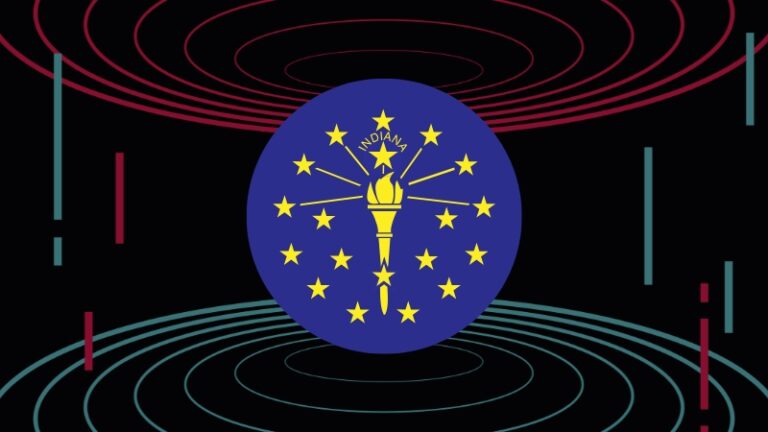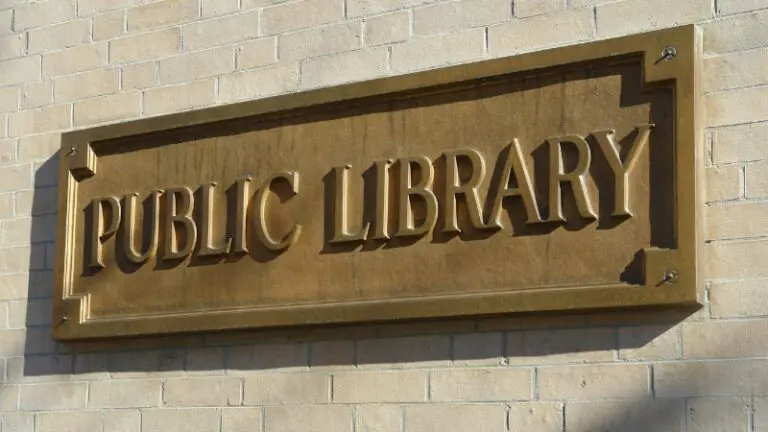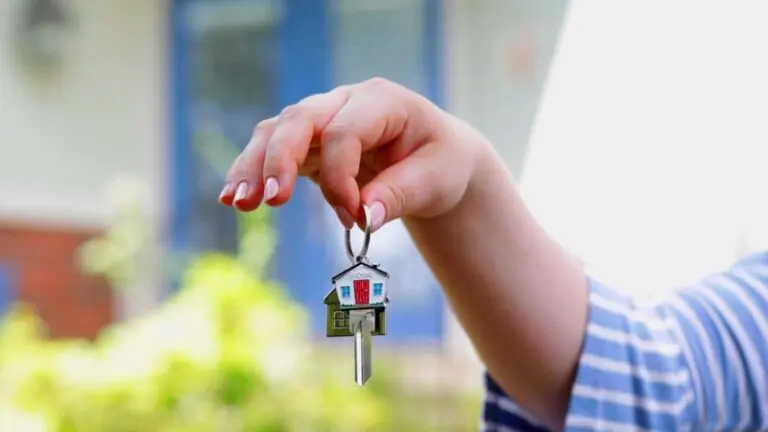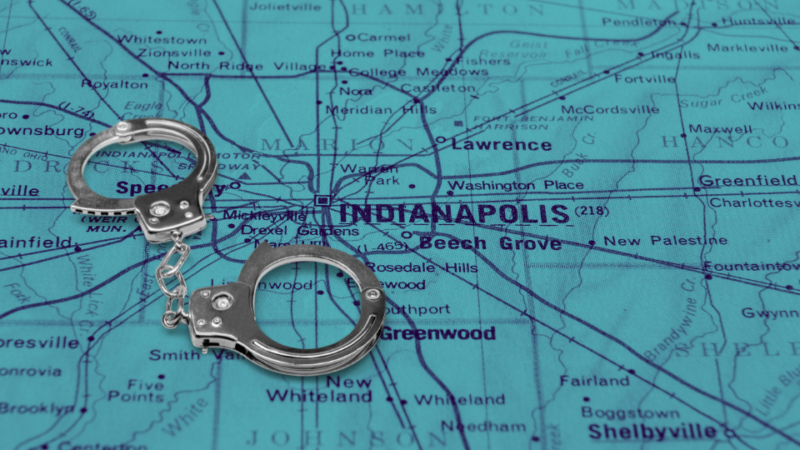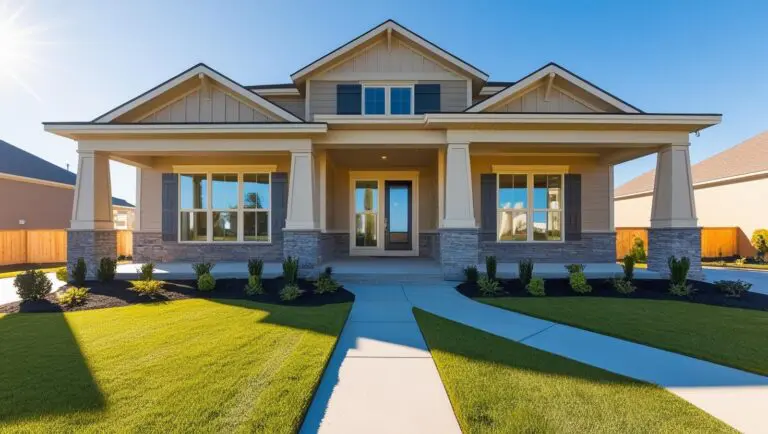On June 27, Indianapolis hit a troubling milestone—its 100th homicide of 2025 after an early-morning shooting on South Meridian Street. While some numbers are up, others have gone down since the peak in 2021.
Today we’ll get into the highs and lows of Indy’s crime trends and see what’s really going on.
*We used Neighbourhood Scout as the main source, based on the data released from the FBI in Oct. 2023 (the latest available), which we further analyzed and compared to other available data.
Table of Contents
ToggleCrime in Indianapolis
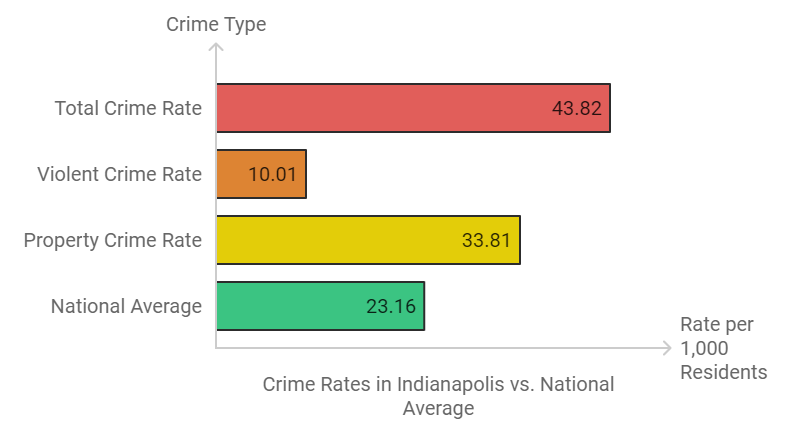
According to Area Vibes, Indianapolis has a total crime rate of 43.82 per 1,000 residents, a staggering 89% higher than the national average.
This might seem like a bunch of numbers, but here’s what it means: if you live in Indianapolis, your chances of falling victim to a violent crime are 1 in 100. For property crime, that number is 1 in 30.
Violent Crimes
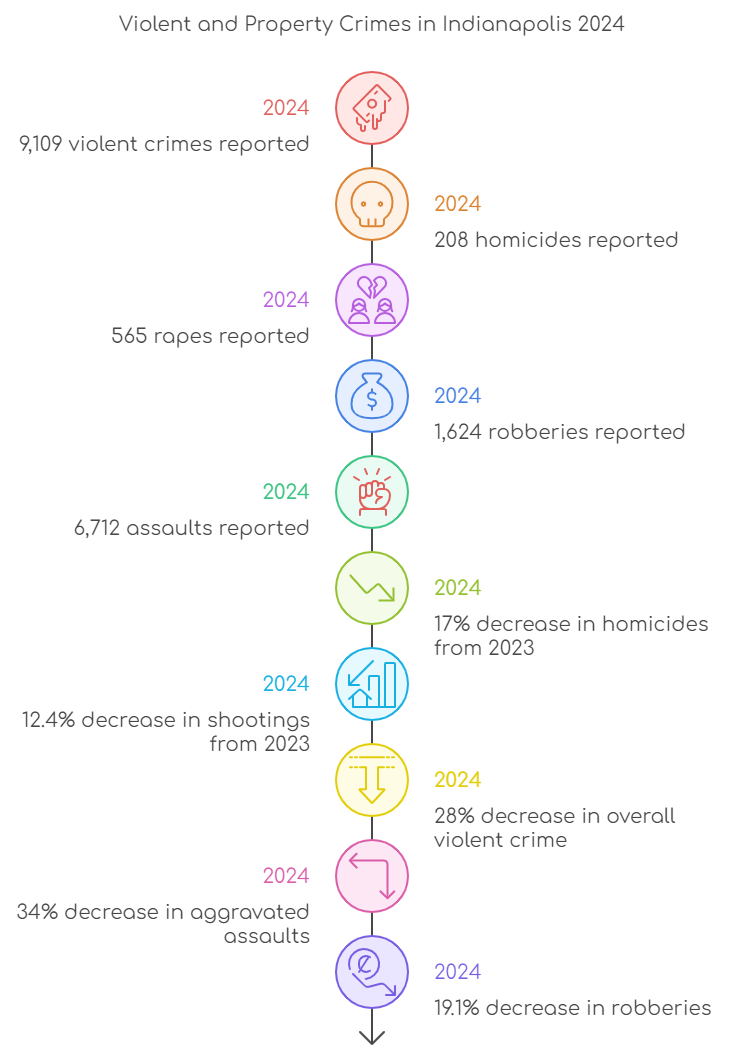
In 2024, there were 9,109 reported incidents of violent crime, including:
| Crime Type | Number of Incidents |
| Homicides | 208 |
| Rape | 565 |
| Robbery | 1,624 |
| Assault | 6,712 |
Even though those numbers are high, there’s been a notable decline. According to Indy Star, homicides are down 17% from 2023, and shootings have dropped by 12.4%. That’s some good news, but it’s hard to feel relieved when 268 people were shot but survived. Check and compare the crime rates in other cities.
Crime rate? Blacks in Gary and Indianapolis.
Drug crimes? Blacks in Gary and Indianapolis.
Don’t value education? Blacks in Gary and Indianapolis. pic.twitter.com/lT7EOQw7P1
— TheCarlSpackler (@Karl_Spacklur) November 8, 2023
Property Crimes
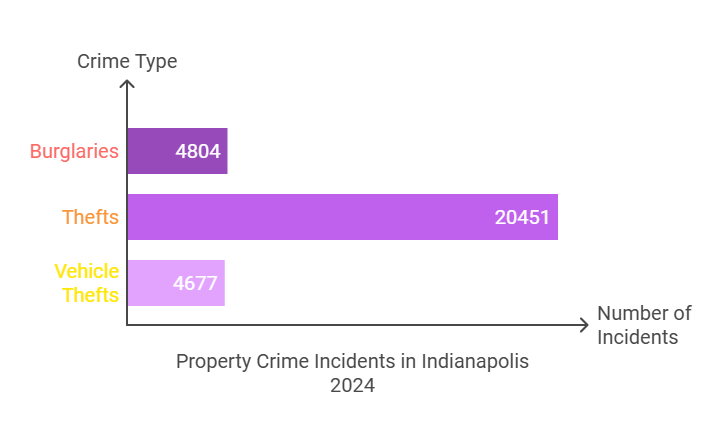
With nearly 30,000 property crimes reported in 2024, Indianapolis still struggles with this category. In other words, your odds of having something stolen in Indianapolis are significantly higher than in other parts of Indiana. The increase in auto thefts is particularly troubling.
| Crime Type | Number of Incidents |
| Burglaries | 4,804 |
| Thefts | 20,451 |
| Vehicle Thefts | 4,677 |
Crime Rate Compared to National Averages
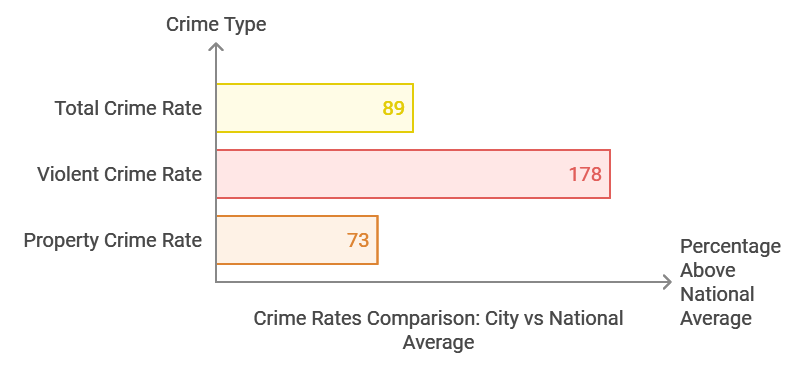
- Total Crime Rate: 89% higher than the national average.
- Violent Crime Rate: 178% higher than the national average.
- Property Crime Rate: 73% higher than the national average.
You’ll Find Safety in the Suburbs
Not all areas around Indianapolis experience crime at the same rate. Economic stability is higher in the suburbs, which lowers the crime rate. The safest neighborhood in the region is Carmel:
- Total Crime Rate: 62% lower than the national average.
- Violent Crime Rate: 82% lower than the national average.
- Property Crime Rate: 59% lower than the national average.
| Crime Type | Carmel Crime Rate (per 100,000) | National Average (per 100,000) |
|---|---|---|
| Assault | 41.3 | 282.7 |
| Murder | 2.0 | 6.1 |
| Rape | 16.7 | 40.7 |
| Robbery | 4.9 | 135.5 |
Living in Carmel feels like a world away from the struggles faced by Indianapolis residents. Niche reports that median home values in Carmel are around $425,900, and median rent is $1,499. It’s a stark contrast that highlights the inequality in the region.
Indianapolis has much higher violent crime rate and only a little lower property crime rate. 🙃 pic.twitter.com/EKivv8r5hp
— Bert (@RW_Bert) February 19, 2024
Investments in Public Safety
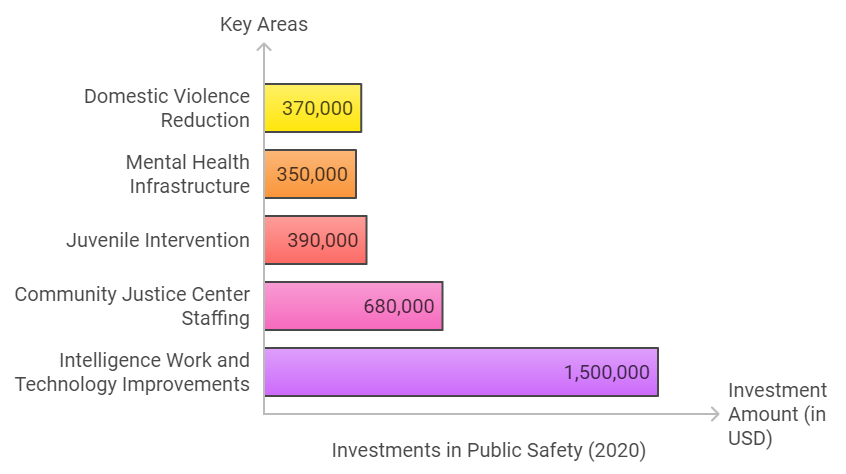
Efforts are being made to address the crime rate. As stated by FOX 59, in 2020. a $3 million investment was directed towards public safety, targeting several key areas:
- $370,000 for domestic violence reduction.
- $350,000 for mental health infrastructure.
- $390,000 for juvenile intervention.
- $680,000 for community justice center staffing.
- $1.5 million for intelligence work and technology improvements.
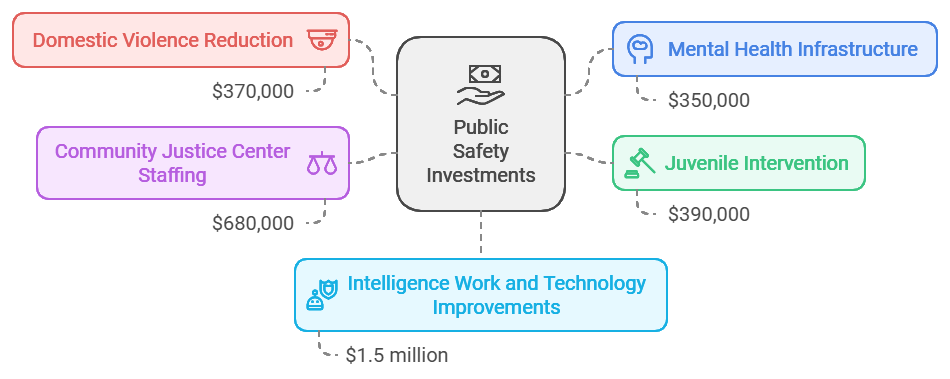
Which Factors Affect These Results?
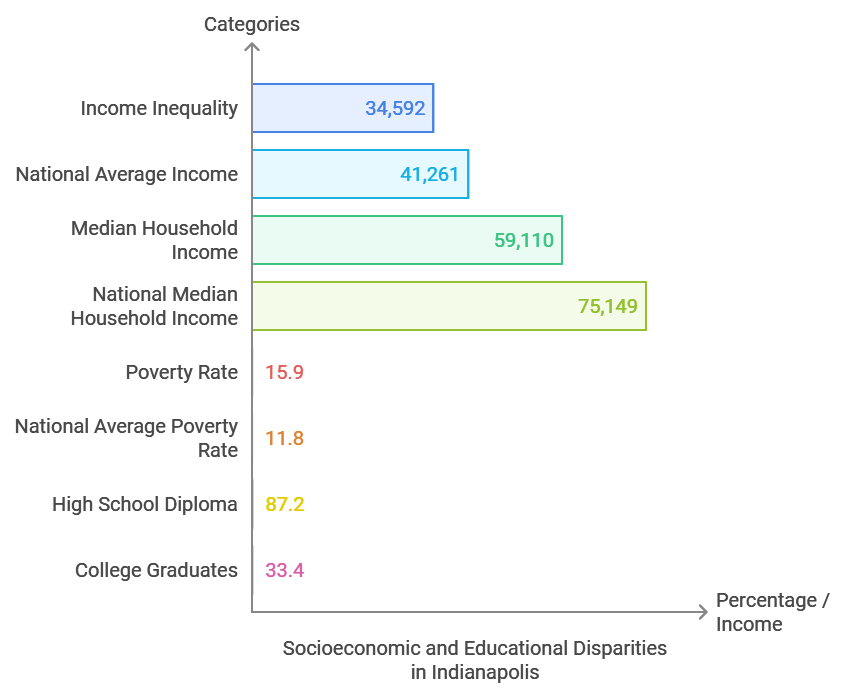
The socioeconomic and educational landscape in Indianapolis reveals key disparities that contribute to higher crime rates, particularly in areas with limited economic resources, lower educational attainment, and elevated poverty levels.
Income Inequality and Economic Opportunities
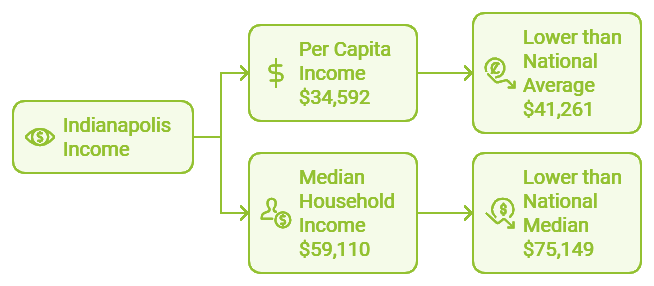
With a per capita income of $34,592, lower than the national average of $41,261, and a median household income of $59,110 compared to the national $75,149, Indianapolis faces notable income disparities.
Poverty and Unemployment Rates
With 15.9% of individuals living below the poverty line, Indianapolis experiences a higher poverty rate than the national average. These economic hardships often correlate with higher crime rates, as people may turn to illegal activities out of necessity or frustration.
Educational Attainment Disparities
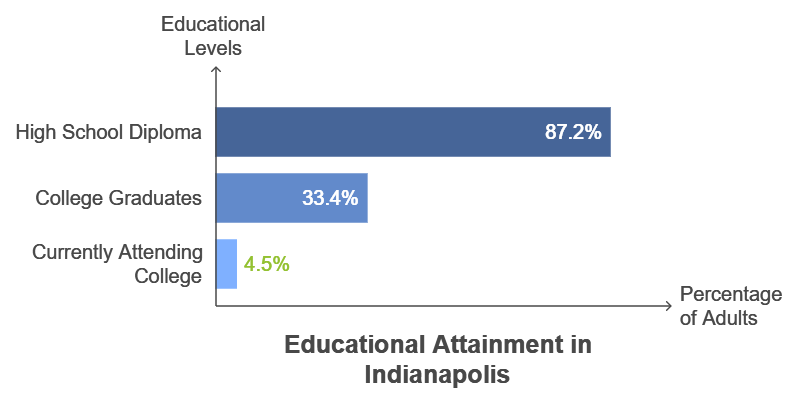
Educational attainment plays a significant role in economic opportunities and crime prevention. In Indianapolis, 87.2% of adults have a high school diploma, and 33.4% have graduated from college. While these rates are relatively promising, only 4.5% of adults are currently attending college, suggesting limited upward mobility for some residents.
What’s Next for Indianapolis?
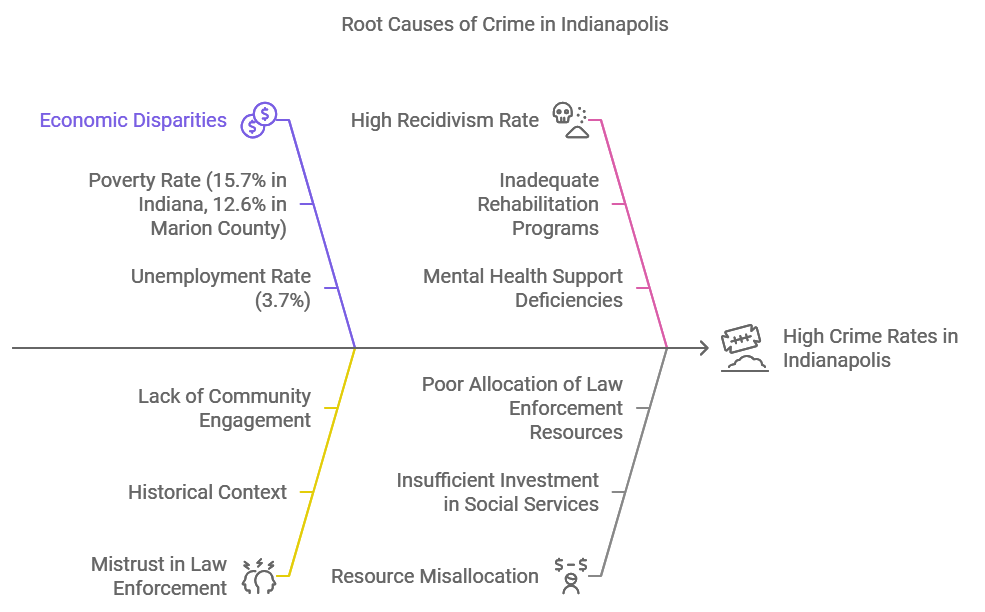
Indianapolis faces major challenges in crime reduction, primarily driven by economic disparities, mistrust in law enforcement, and a high recidivism rate of 56%. Economic inequality, resource misallocation, and community-police mistrust exacerbate these issues.
However, opportunities exist to address root causes of crime through investment in social services, targeting poverty (15.7% in Indiana, 12.6% in Marion County) and unemployment (3.7%).
Technology, enhanced community policing, mental health support, and rehabilitation programs are seen as key areas for improving crime prevention and reducing recidivism, fostering more inclusive and effective solutions.
Final Thoughts
Crime in Indianapolis is a complex issue, but it’s not insurmountable. Despite the sobering statistics, there are signs of progress. The reduction in violent crime is encouraging, and investments in public safety are steps in the right direction.
Sources
1. Neighborhood Scout – Indianapolis, IN Crime Rates
2. Area Vibes – Indianapolis, In Crime Rates
3. Indy Star – How crime in Indy has fallen, and risen, so far in 2024
4. FOX 59 – CRIME MAPPING: Tracking homicides across Indianapolis
5. NICHE – Indianapolis Carmel
Related Posts:
- Carmel Crime Rate 2025 - What the Latest Numbers Reveal
- How Does the Fort Wayne Crime Rate Look Like in 2025?
- South Bend Crime Rate in 2025 - Looking at Statistics
- Lafayette, Indiana Crime Rate 2025 - What You Need to Know
- Gary, Indiana Population in 2025 - Latest Census…
- Tour of the Children’s Museum of Indianapolis:…



